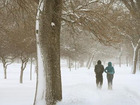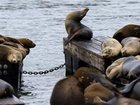Two European Galileo satellites launched by a Russian-built rocket on Friday from French Guiana have not reached their intended orbit, launch firm Arianespace said Saturday.
"Observations taken after the separation of the satellites from the Soyuz VS09 (rocket) for the Galileo Mission show a gap between the orbit achieved and that which was planned," the company said in a statement.
 Full Story
Full Story
Australian spiders may live happily in the bush, but a new study has found that at least one species also thrives on city life and grows bigger in urban areas.
The University of Sydney's Elizabeth Lowe said while research showed invertebrates were sensitive to urbanization, not all species were negatively affected by living in cities.
 Full Story
Full Story
Thieves who tapped an oil pipeline in northern Mexico caused a spill that contaminated the San Juan River, a key irrigation source for farmers, authorities said Thursday.
The crude from the Madero-Cadereyta pipeline polluted a 23-kilometer (14-mile) stretch of the river in Nuevo Leon state, said federal environmental protection agency Profepa.
 Full Story
Full Story
Deep in the hilly grasslands of remote Inner Mongolia, twin smoke stacks rise more than 200 feet into the sky, their steam and sulfur billowing over herds of sheep and cattle. Both day and night, the rumble of this power plant echoes across the ancient steppe, and its acrid stench travels dozens of miles away.
This is the first of more than 60 coal-to-gas plants China wants to build, mostly in remote parts of the country where ethnic minorities have farmed and herded for centuries. Fired up in December, the multibillion-dollar plant bombards millions of tons of coal with water and heat to produce methane, which is piped to Beijing to generate electricity.
 Full Story
Full Story
A Japanese whaling vessel and its crew were being held in Russia on Friday after the ship entered Russian territorial waters without permission, Tokyo said.
The 712-tonne Shonan-maru No.2 was ordered into a Russian port on August 15 after sailing through the Sea of Okhotsk off Sakhalin island, an official from Japan's Fisheries Agency said.
 Full Story
Full Story
Scientists using GPS technology to study the extent of the western U.S. drought said Thursday the water shortage is causing parts of the Earth's crust to rise.
Some 62 trillion gallons -- equivalent to a six-inch (15-centimeter) layer of water -- have been lost since 2013, causing a slight upward lift across the region, according to the study in the journal Science.
 Full Story
Full Story
The Old Farmer's Almanac, the familiar, 223-year-old chronicler of climate, folksy advice and fun facts, is predicting a colder winter and warmer summer for much of the nation.
Published Wednesday, the New Hampshire-based almanac predicts a "super-cold" winter in the eastern two-thirds of the country. The west will remain a little bit warmer than normal.
 Full Story
Full Story
Neanderthals shared Europe with modern humans for as long as five millennia until they died out 40,000 years ago -- "ample time" for cultural exchanges and interbreeding, researchers said on Wednesday.
While there is no evidence that the two groups lived closely together, they did co-exist for anything from 25 to 250 generations, depending on the region, according to a paper published in the journal Nature.
 Full Story
Full Story
A chemical used in dry cleaning and fire extinguishers may have been phased out in recent years but NASA said Wednesday that carbon tetrachloride (CCl4) is still being spewed into the atmosphere from an unknown source.
The world agreed to stop using CC14 as part of the Vienna Convention on Protection of the Ozone Layer and its Montreal Protocol, which attained universal ratification in 2009.
 Full Story
Full Story
Seals and sea lions probably brought tuberculosis to the Americas centuries before Christopher Columbus first set foot there, scientists said Wednesday.
A new study challenges the theory that Europeans introduced TB to the New World, where it killed millions of indigenous Americans along with other foreign diseases like whooping cough, chicken pox and flu.
 Full Story
Full Story



